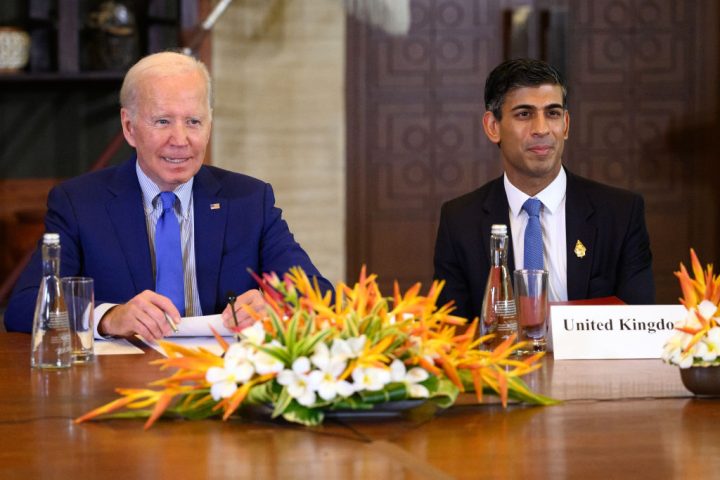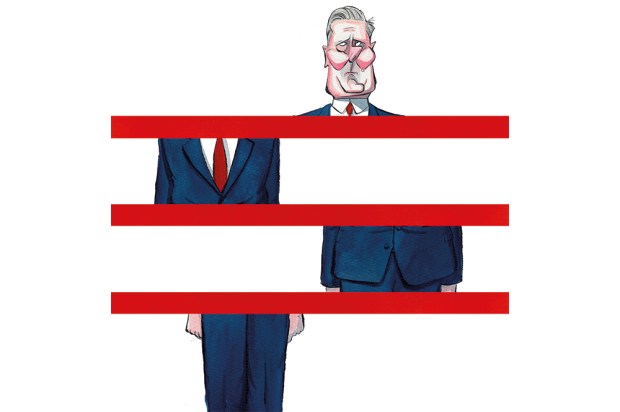The US government has warned British security officials that the ‘five eyes’ intelligence-sharing agreement may be at risk if the UK imperils the Good Friday Agreement by pulling out of the European Convention of Human Rights (ECHR). I understand that this point has been made recently, and fairly clearly, in talks between the UK and US sides.
Rishi Sunak has been holding open the prospect of withdrawing from the ECHR if it frustrates his plans to deport asylum seekers who enter the UK illegally. But this would blow a hole in the Good Friday Agreement (GFA), which says that citizens of Northern Ireland will receive human rights protections based on the convention. The Biden administration has been making clear that it is determined to defend the GFA’s provisions.
The warnings to London are the latest sign of US concern about Northern Ireland
Insiders familiar with these conversations say that the Biden administration would not shut the UK out of the intelligence it shares with Canada, Australia and New Zealand if the UK leaves the ECHR. Rather, I’m told, US officials have been reminding their British counterparts that the President’s executive discretion to pass on US intelligence rests on the current ‘legal status’ of America’s partners. If the UK changes its legal status by leaving the ECHR, the US could ask for more concessions or restrict what intelligence the British could receive. ‘I would not say the Americans are threatening us,’ one source said. ‘It’s more of a gentle warning about what the future may hold.’
Even the smallest change to the status quo would panic the British intelligence services, which rely on their special relationship with the US. Especially so ahead of the coming Aukus nuclear submarine deal, which is expected to be accelerated in coming weeks with an announcement that British rather than American submarines will be used with extensive manufacturing.
Washington is deploying lawyerly language as an excuse. If Canada amended its constitution it wouldn’t dream of threatening intelligence cooperation. The warnings to London are the latest sign of US concern about Northern Ireland, whose future Rishi Sunak is currently attempting to settle without provoking a revolt from Boris Johnson and others in his party.
Washington’s warnings to the British security establishment follow tough talking in September last year. During Liz Truss’s brief premiership, the Biden administration told her there was no possibility of a post-Brexit trade deal between the UK and US if she stood by her threats as foreign secretary to rip up the post-Brexit trading arrangements in Northern Ireland.
The UK’s commitment to the ECHR is in doubt. After the European Court of Human Rights stopped the government’s plans to deport asylum seekers to Rwanda, the official government position is now to refuse to rule out the possibility that the UK may join Belarus and Russia in leaving the convention. The stance as articulated by Dominic Raab looks like brinkmanship: the government will threaten the rights court until the UK gets its way on the Rwanda scheme. If it does, all will be well.
But there is a fierce internal battle in Whitehall because Suella Braverman plans to go far further. The Home Secretary is briefing that she wants to bar anyone who enters the UK illegally from making an asylum claim and deport them instead. This would breach not just the European convention, which Braverman is all in favour of leaving, but also the 1951 UN refugee convention which obliges all signatories to grant asylum to anyone with a ‘reasonable fear of prosecution’.
With hardly any legal routes into the UK for nearly any refugee who is not Ukrainian, it is easy to see how a court would accept a challenge to such a policy. Senior Conservative politicians say off the record that Sunak has to pick a side: either he goes with Braverman when the asylum measures come out later this month or he listens to her critics.
When asked whether the threat to the rule of law had caused a rift between Braverman and Victoria Prentis, the Attorney General, all one Downing Street spokeswoman would say was, ‘We will bring forward new legislation to restore fairness, fix our asylum system and stop the boats – delivering on one of the government’s key priorities. Further detail will be set out in due course.’
It would be surprising if the Attorney General was not concerned about tearing up the 1951 refugee convention. The office of the UN’s High Commissioner for Refugees warned in the autumn that a blanket ban on access to asylum in the UK for those arriving irregularly ‘would almost certainly’ breach it. ‘The only way to establish whether people are refugees ‘is through a fair and efficient determination of their claims, for which the UK has a clear responsibility’.
The Home Secretary’s colleagues have expressed surprise that, as a former Attorney General herself, Ms Braverman did not already accept that. Perhaps she did, but did not care. Or could see a legal route around it. But there’s nothing to suggest that Prentis, as Attorney General, would agree with Braverman’s hardline position – or be bulldozed or sweet-talked regarding the UK’s treaty obligations. The two certainly seem to have different perspectives. It is a matter of record that Prentis was the first MP to open her home to a Ukrainian refugee, while Ms Braverman speaks of Britain facing an ‘invasion’.
So we could be set for some Whitehall wars, with a winner expected in the next few weeks. If Sunak rules out blanket bans on asylum claims and says he’ll stay in the ECHR, then it will show that the prime minister worries most about the UK’s global reputation and its relationship with its allies. If he does not, it will show that he feels unable to take on the right of his party – and along with his other handicaps, he will have lumbered the UK with an Attorney General unable to uphold the law.
Got something to add? Join the discussion and comment below.
Get 10 issues for just $10
Subscribe to The Spectator Australia today for the next 10 magazine issues, plus full online access, for just $10.





















Comments
Don't miss out
Join the conversation with other Spectator Australia readers. Subscribe to leave a comment.
SUBSCRIBEAlready a subscriber? Log in